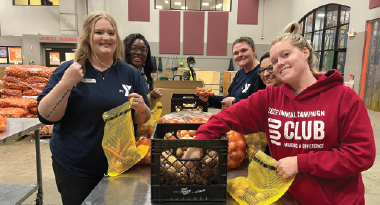
It is that time of the year where we get to start thinking about what delicious foods we will gather around whilst talking with those who we hold closest to us. Have you ever thought about how all of us have one particular thing in common that unites us all? We want to say that it is food.
However, some people in our communities do not have the access to such items to make meals for themselves as well as their families.
So, you might be wondering what to donate to a food pantry? We are here to help answer that question.
The Gateway Region YMCA is a nonprofit, 501(c)(3) charity dedicated to nurturing the potential of every child and teen, improving health and well-being, and supporting and serving our neighbors. We believe in giving back to our communities who do so much for us! In an attempt to give back, we encourage not only our Y members to give back, but also those people who reside in our communities. When you give back to food banks in your area, that action gives back directly to your neighbors, and makes an influence greater than we will ever know. After all, some people who attend food banks are going through hard times and might be ashamed to otherwise ask for assistance. You are not only helping out strangers but potentially friends and family, too.
Non-perishable food items are always appreciated by food banks as they do not go bad as quickly and could even be considered the best food to donate to food banks. To list some of the non-perishable food items recommended to donate are: peanut butter, pasta (“most prefer whole grain”), canned meat (SPAM and Ham), canned vegetables, canned chicken, canned fish (Tuna and Salmon), canned fruit, as well as beans and lentils. Providing nutritious food that can also feed more than one person at a time, makes a ripple effect in people’s lives. Not having to stress about providing meals for their families, or young children helps those in need tremendously. What other items do your food banks need? Donating rice (“most prefer brown”), nuts, pasta sauce (“alfredo, pesto, or shelf-stable bolognese or marinara”), granola bars, powdered milk, whole-grain cereal, applesauce, crackers, cooking oil (olive and canola), instant mashed potatoes, soup, stew, and chili, meals in a box, dried herbs and spices.
You might be wondering what items to skip when donating. Taste of Home recommends what to not donate to a food bank, and that would be, “junk food, items with glass or cellophane packaging, which can be broken in transit, things that need can openers or special equipment (pop-top cans–whether for veggies, meat or fruit–are a plus).” Feeding America also mentions things not to donate to a food bank: “items needing refrigeration, expired food, leftovers, food with packaging concerns, and baked goods.”
This one is not a food item, but for those in need, accessing feminine hygiene products is less than an easy process and not to mention, expensive. Donating pads or tampons can help to take a burden off of those who need them most. Additionally, toilet paper and baby food are also always welcomed as they are also a necessity but not always accessible for some. Baby food like, “pouches or jars, as well as toddler-geared snacks” as well as diapers, are sure to make a lasting impact according to Local Love.
Why donate alone, when you could make this a family event? We believe that raising charitable children is important because they are the next generation to change the world. Giving is easy. If you do not have the funds to donate, donating your time is just as valuable! After all, one of the greatest gifts that one could give is the gift of time. Food banks and shelters are always looking for volunteers. Also, there are multiple benefits to raising a charitable child, but to name a few would be that “Kids who volunteer are more likely to have a greater respect for others, develop leadership skills, and have an understanding of citizenship that can carry over into adulthood,” (Child Trends). Or how, “Learning about giving and helping others gives children a feeling of empowerment,” (The Balance). And finally, “Children who are charitable have a greater appreciation for what they have because they know of others who aren’t as fortunate as they are.” More information about raising charitable children can be found here.
Are you feeling compelled to donate to a food bank near you? Utilize the food drives being held by YMCA’s throughout the Association from November 1-20. Can’t make it in-person? We are also taking monetary donations online to assist with food drives, and other community outreach that we extend.
Join us on our continuous mission to make a positive difference in the lives of the families we come in contact with. We all need the Y in one way or another. For some, this is a place of employment, for others this a safe place to workout or spend time with loved ones, and for others it is what changed their lives. Don’t you want to be a part of that? Learn more about volunteer opportunities at the YMCA here.